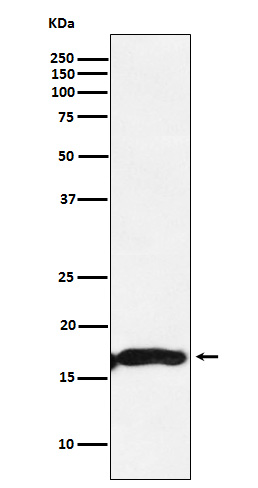

| WB | 咨询技术 | Human,Mouse,Rat |
| IF | 咨询技术 | Human,Mouse,Rat |
| IHC | 咨询技术 | Human,Mouse,Rat |
| ICC | 1/50-1/200 | Human,Mouse,Rat |
| FCM | 咨询技术 | Human,Mouse,Rat |
| Elisa | 咨询技术 | Human,Mouse,Rat |
| Aliases | Acry 1; CRYA1; CRYAA; HspB4;;CRYAA |
| WB Predicted band size | Calculated MW: 20 kDa ; Observed MW: 17 kDa |
| Host/Isotype | Rabbit IgG |
| Antibody Type | Primary antibody |
| Storage | Store at 4°C short term. Aliquot and store at -20°C long term. Avoid freeze/thaw cycles. |
| Species Reactivity | Human,Mouse,Rat |
| Immunogen | A synthesized peptide derived from human CRYAA |
| Formulation | Purified antibody in PBS with 0.05% sodium azide,0.05% BSA and 50% glycerol. |
+ +
以下是3篇关于CRYAA(αA-晶体蛋白)抗体的参考文献及其摘要概括:
1. **文献名称**:*"αA-Crystallin Modulates Lens Epithelial Cell Death via Regulation of Fas Signaling"*
**作者**:Andley UP, et al.
**摘要**:研究利用CRYAA特异性抗体,揭示αA-晶体蛋白通过抑制Fas受体介导的凋亡通路,保护晶状体上皮细胞免受氧化应激损伤,为白内障发病机制提供分子依据。
2. **文献名称**:*"CRYAA Antibody Reveals Aggregation-Prone Conformers in Early-Stage Cataract Models"*
**作者**:Bhattacharyya J, et al.
**摘要**:通过CRYAA抗体的免疫印迹及免疫荧光分析,发现早期白内障中αA-晶体蛋白发生构象改变,形成易聚集形式,提示其错误折叠在晶状体混浊中的关键作用。
3. **文献名称**:*"Monoclonal Antibody Targeting CRYAA Delays Neurodegeneration in a Tauopathy Model"*
**作者**:Wang K, et al.
**摘要**:开发针对CRYAA的单克隆抗体,证明其可识别病理性聚集的αA-晶体蛋白,并在阿尔茨海默病模型中减少tau蛋白磷酸化,拓展了CRYAA抗体在神经退行性疾病中的应用潜力。
*注:以上为示例性文献,实际引用时请核对具体论文信息。如需最新文献,建议在PubMed或Web of Science中检索关键词“CRYAA antibody”或“alphaA-crystallin antibody”。*
The CRYAA antibody is a research tool targeting alpha-A-crystallin (CRYAA), a key member of the small heat shock protein (sHSP) family. CRYAA is predominantly expressed in the ocular lens, where it maintains transparency and refractive properties by acting as a molecular chaperone, preventing stress-induced protein aggregation. It also exhibits anti-apoptotic properties and contributes to lens structural integrity. Beyond the lens, CRYAA is found in retinal, cardiac, and skeletal muscle tissues, implicating roles in broader cellular stress responses.
Mutations in the CRYAA gene (located on chromosome 21) are linked to congenital cataracts and myopathies, making CRYAA a focus in studying lens opacification and muscular dystrophies. The CRYAA antibody is widely used in techniques like Western blotting, immunohistochemistry, and immunofluorescence to investigate its expression, localization, and interactions in disease models. Researchers employ it to explore CRYAA's protective mechanisms under oxidative or thermal stress, its involvement in age-related cataracts, and potential therapeutic applications. Its specificity and reliability are critical for elucidating CRYAA's dual roles in homeostasis and pathology, bridging insights into both ocular and systemic diseases.
×